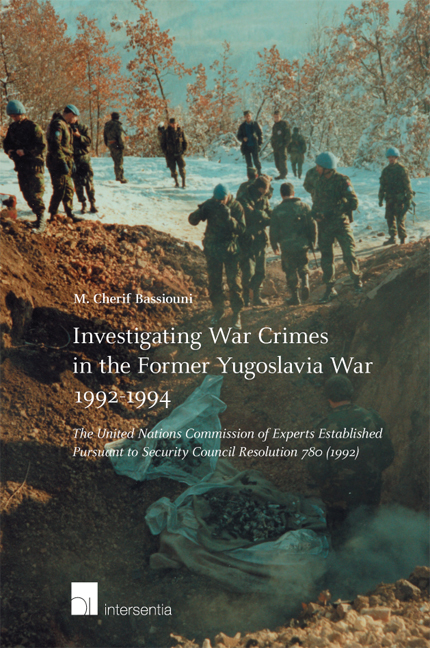 Investigating War Crimes in the Former Yugoslavia War 1992–1994
Investigating War Crimes in the Former Yugoslavia War 1992–1994 Book contents
- Frontmatter
- Contents
- Dedication
- About this Book
- About the Author
- Acknowledgement
- Table of Abbreviations
- Table of Authorities
- Chapter I Background on the Conflict in the Former Yugoslavia
- Chapter II Some Pictorial Descriptions
- Chapter III An Overview of the Realpolitik and the Workings of the Commission of Experts
- Chapter IV Precedents Leading to United Nations Security Council Resolution 780 (1992)
- Chapter V The Commission of Experts’ Establishment and Processes
- Chapter VI Final Report of the Commission of Experts Established Pursuant to Security Council Resolution 780 (1992) and Annex Summaries and Conclusions
- Chapter VII The Absence of a Transition between the Commission of Experts and the ICTY
- Chapter VIII Experiences that Affected Me the Most During My Tenure on the Commission of Experts
- Chapter IX Concluding Reflections
Chapter IX - Concluding Reflections
Published online by Cambridge University Press: 12 October 2018
- Frontmatter
- Contents
- Dedication
- About this Book
- About the Author
- Acknowledgement
- Table of Abbreviations
- Table of Authorities
- Chapter I Background on the Conflict in the Former Yugoslavia
- Chapter II Some Pictorial Descriptions
- Chapter III An Overview of the Realpolitik and the Workings of the Commission of Experts
- Chapter IV Precedents Leading to United Nations Security Council Resolution 780 (1992)
- Chapter V The Commission of Experts’ Establishment and Processes
- Chapter VI Final Report of the Commission of Experts Established Pursuant to Security Council Resolution 780 (1992) and Annex Summaries and Conclusions
- Chapter VII The Absence of a Transition between the Commission of Experts and the ICTY
- Chapter VIII Experiences that Affected Me the Most During My Tenure on the Commission of Experts
- Chapter IX Concluding Reflections
Summary
For thousands, if not millions of years, human beings have destroyed one another, often by those who have the power using it to inflict harm on the less powerful for reasons beyond necessary survival. In the course of such conduct, there has always been a way in which the more powerful rationalized their actions against the weaker, particularly by developing all sorts of questionable propositions about some humans as being inferior to others. Many conflicts from the Middle Ages on, particularly since World War One, have involved some persons being characterized by other persons as lesser humans and implicitly deserving of being tortured, mistreated, held in servitude and killed. For the Nazis during World War Two the Untermensch was the Jew, but also the gypsies, the Slavs and the handicapped. And the Untermensch was not much different from being a slave. The taking and use of slaves has been recorded more than three millennia ago, while the Atlantic slave trade operated from the 16th to the 19th century, and was essentially based on race, black slaves brought from Africa and Native Americans taken as slaves in North America. But why were these enslaved persons viewed as lesser human beings than others, with the implication that they could be exploited, tortured and massacred at will, by those more powerful particularly, by those in the Western world. Was there no common standard of humanity that would have been opposed to such practices?
Opposition to such practices and treatment of humans existed long before these policies and practices were recorded. The Ten Commandments, found both in the Jewish Torah and later the Christian Bible's Old Testament, categorically oppose such practices as stated in the sixth commandment “thou shalt not kill.” In the Book of the Micah, the message of God is once again clear that humans are to treat one another justly and with kindness, “He has told you, O man, what is good; And what does the Lord require of you But to do justice, to love kindness, And to walk humbly with your God?”
The teaching of Yashua, whose Greek name was Jesus, and who in conformity with his higher human values that were divinely inspired in so far as we believed in the existence of a single God, whom we cannot describe, also condemned such treatment of our fellow human beings.
- Type
- Chapter
- Information
- Investigating War Crimes in the Former Yugoslavia War 1992–1994The United Nations Commission of Experts Established Pursuant to Security Council Resolution 780 (1992), pp. 443 - 452Publisher: IntersentiaPrint publication year: 2017


